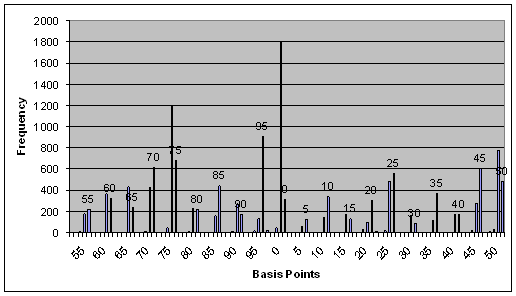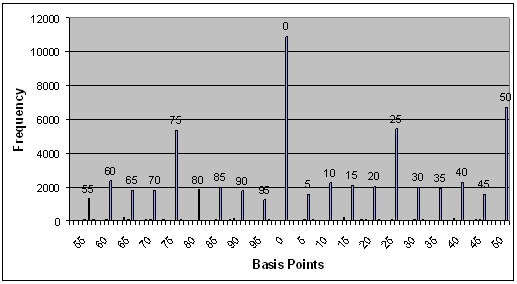The point 99 syndrome – a nice little earner for Banks and Building Societies
Banks and building societies are taking a leaf out of supermarkets’ books to increase their profits at the expense of some consumers’ limited ability to process numbers, according to new research from the Universities of East Anglia and Leeds working with Moneyfacts.co.uk
Dr John Ashton of the ESRC Centre for Competition Policy at the University of East Anglia and Dr Robert Hudson of Leeds University Business School, using data from Moneyfacts.co.uk, found that interest rates for a disproportionate number of UK mortgages end in .99, rather than a whole figure, which is used far more for deposit accounts.
“It’s the same practice that supermarkets apply when they offer a product at £1.99 instead of £2. Many of us will – consciously or not – round that figure down and think we are getting something cheaper,” said Dr Ashton.
The research undertaken identifies that this is a widespread practice in the UK deposit and mortgage markets and suggests that this practice is consistent with banks attempting to gain the greatest profits from consumers with the least ability to process price and number information.
The researchers firstly produced a model, which demonstrates which particular digits maximise profits for banks when customers round and truncate interest rates – actions many customers use to help them remember and recall number information. The model predicts that banks maximise their profits from mortgages by setting interest rates just below whole numbers (integers) or other reference points, for example, at 3.99% instead of 4% or 4.95% instead of 5%. For deposit accounts, banks maximise their profits by setting interest rates at whole numbers and reference points such as half or quarter points, for example at 4%, 4.5% or 4.75%.
MORTGAGE RATES

Secondly the study, using data provided by Moneyfacts.co.uk, on the UK mortgage and deposits markets over a 12 year period (1993-2004), quantifies the degree of clustering of digits in interest rates set in these markets. It is reported that well over three quarters of all firms providing deposits set interest rates in a manner consistent with maximising profits from customers who tend to round figures up or down.
DEPOSIT RATES

Indeed from assessing interest rates from over 1,294 deposit products issued by 176 firms, the majority of interest rates recorded are integers, half points or at quarters (e.g. 5.00%, 5.50% or 5.25%). The degree of digit clustering at integers, half points and quarters is substantially greater in interest rates for smaller deposits, than for larger deposits. Further, this is a practice which is most commonly used when customers have smaller quantities to invest.
The level of clustering in mortgage markets at points just below integers, half points and quarters also occurs in just under half of all institutional mortgage interest rates recorded over the 12-year period.
Considering the implications of the research for customers, Dr Robert Hudson from Leeds University Business School reported “Perhaps the most surprising and worrying aspect of our research has been the setting of interest rates in a manner which takes advantage of those with the least to invest. It is clear that ‘clustered pricing effects’ occur most for smaller savers, and those with the most to lose from this practice.”
NOTES TO EDITORS:
For further information please contact:
Dr John K Ashton
Norwich Business School and ESRC Centre for Competition Policy.
University of East Anglia, Norwich. NR4 7JT.
Tel. 01603 591618 and mobile number 07891 355040
E-mail: j.ashton@uea.ac.uk. http://www.mgt.uea.ac.uk/
Or
Dr Robert Hudson
Leeds University Business School
Maurice Keyworth Building
The University of Leeds, Leeds LS2 9JT
Tel. 0113 343 1677
E-mail: rsh@lubs.leeds.ac.uk http://lubswww.leeds.ac.uk/lubs/
Think carefully before securing other debts against your home, your home may be repossessed if you do not keep up repayments on your mortgage.
Go Direct.co.uk is a trading style for website purposes of Go Direct UK Ltd.
Go Financial Services is a trading style of Go Direct UK Ltd which is an appointed representative of Personal Touch Financial Services Ltd which is authorised and regulated by the Financial Conduct Authority. Registered in England & Wales Company 5703224. FCA Number 456600
We normally do not charge a fee for mortgage advice, however this is dependent on your circumstances. Our typical fee would be £349




